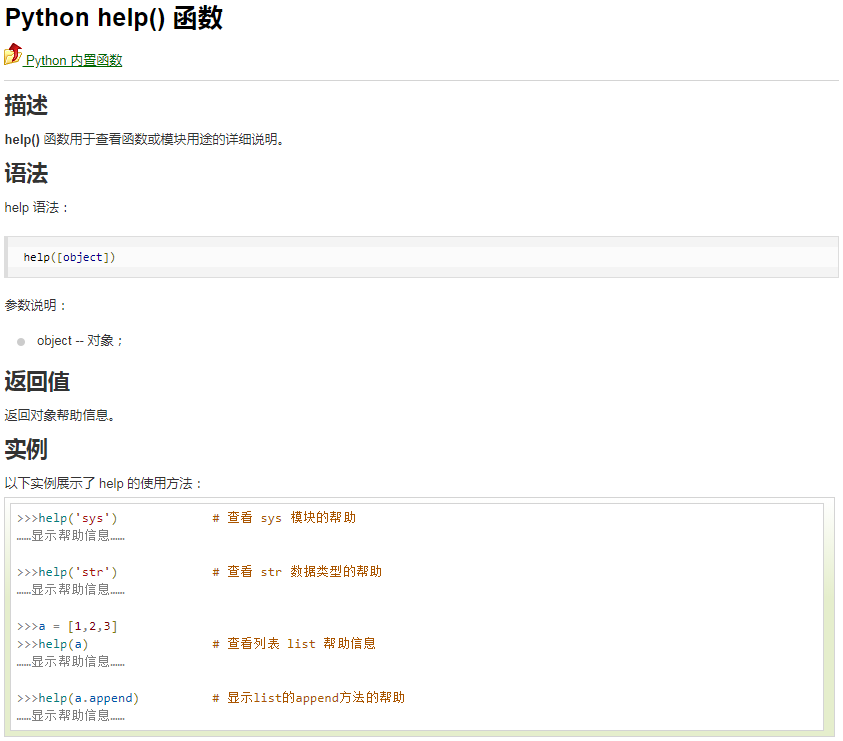【Python】【基础知识】【内置函数】【help的使用方法】
原英文帮助文档:
help([object])
Invoke the built-in help system. (This function is intended for interactive use.) If no argument is given, the interactive help system starts on the interpreter console. If the argument is a string, then the string is looked up as the name of a module, function, class, method, keyword, or documentation topic, and a help page is printed on the console. If the argument is any other kind of object, a help page on the object is generated.
This function is added to the built-in namespace by the site module.
Changed in version 3.4: Changes to pydoc and inspect mean that the reported signatures for callables are now more comprehensive and consistent.
————————(我是分割线)————————
中文解释
调用内置的帮助系统。(这个函数用于交互模式使用)
如果未给出参数,则交互帮助系统将在解释器控制台上启动。
示例:
>>> help Type help() for interactive help, or help(object) for help about object. >>> help() Welcome to Python 3.7's help utility! If this is your first time using Python, you should definitely check out the tutorial on the Internet at https://docs.python.org/3.7/tutorial/. Enter the name of any module, keyword, or topic to get help on writing Python programs and using Python modules. To quit this help utility and return to the interpreter, just type "quit". To get a list of available modules, keywords, symbols, or topics, type "modules", "keywords", "symbols", or "topics". Each module also comes with a one-line summary of what it does; to list the modules whose name or summary contain a given string such as "spam", type "modules spam". help> abs Help on built-in function abs in module builtins: abs(x, /) Return the absolute value of the argument. help> input Help on built-in function input in module builtins: input(prompt=None, /) Read a string from standard input. The trailing newline is stripped. The prompt string, if given, is printed to standard output without a trailing newline before reading input. If the user hits EOF (*nix: Ctrl-D, Windows: Ctrl-Z+Return), raise EOFError. On *nix systems, readline is used if available. help> input() No Python documentation found for 'input()'. Use help() to get the interactive help utility. Use help(str) for help on the str class. help> quit You are now leaving help and returning to the Python interpreter. If you want to ask for help on a particular object directly from the interpreter, you can type "help(object)". Executing "help('string')" has the same effect as typing a particular string at the help> prompt. >>>
---退出帮助模式使用quit
如果参数是字符串,则该字符串将作为模块、函数、类、方法、关键字或文档主题的名称查找,并在控制台上打印帮助页。
>>> help("time") Help on built-in module time: NAME time - This module provides various functions to manipulate time values. DESCRIPTION There are two standard representations of time. One is the number of seconds since the Epoch, in UTC (a.k.a. GMT). It may be an integer or a floating point number (to represent fractions of seconds). The Epoch is system-defined; on Unix, it is generally January 1st, 1970. The actual value can be retrieved by calling gmtime(0). The other representation is a tuple of 9 integers giving local time. The tuple items are: year (including century, e.g. 1998) month (1-12) day (1-31) hours (0-23) minutes (0-59) seconds (0-59) weekday (0-6, Monday is 0) Julian day (day in the year, 1-366) DST (Daylight Savings Time) flag (-1, 0 or 1) If the DST flag is 0, the time is given in the regular time zone; if it is 1, the time is given in the DST time zone; if it is -1, mktime() should guess based on the date and time. CLASSES builtins.tuple(builtins.object) struct_time class struct_time(builtins.tuple) | struct_time(iterable=(), /)
.
.
.
.
.
.
如果参数是任何其他类型的对象,则会生成该对象的帮助页。
>>> a = "test" >>> help(a) Help on package test: NAME test - # Dummy file to make this directory a package. PACKAGE CONTENTS __main__ _test_multiprocessing ann_module ann_module2 ann_module3 audiotests autotest bad_coding bad_coding2 bad_getattr bad_getattr2 bad_getattr3 badsyntax_3131 badsyntax_future10 badsyntax_future3 badsyntax_future4 badsyntax_future5 badsyntax_future6 badsyntax_future7 badsyntax_future8 badsyntax_future9 badsyntax_pep3120 bisect bytecode_helper
.
.
.
.
.
.
>>> help("ls") No Python documentation found for 'ls'. Use help() to get the interactive help utility. Use help(str) for help on the str class.
此函数由站点模块添加到内置命名空间中。
版本3.4中的更改:pydoc和inspect的更改意味着所报告的可调用签名现在更加全面和一致。
———————(我是分割线)————————

————————(我是分割线)————————
参考:
1. Python 3.7.2 documentation
2. RUNOOB.COM:https://www.runoob.com/python/python-func-help.html
备注:
初次编辑时间:2019年9月21日21:08:21
环境:Windows 7 / Python 3.7.2


